Available in English, Spanish, German and Polish... French coming soon!
Zukor's Air is flying themed feedback game featuring high-quality aircraft, animals and fantasy creatures. It is designed to appeal to a broad range of people, including all ages of men, women, boys, girls and children.
Zukor's Air has a simple, central focus gameplay in which you fly through rings or at targets for points. The patient receives continuous “training points” when meeting the event criteria the clinician establishes in the feedback system software and bonus points related to the rings or targets.
Zukor's Air can be easily modified in many ways to fit the clinicians training protocol or the patient. The flight environment can be minimal with the flight taking place over beautiful, lightly moving water surrounded by lush clouds. Alternatively, the flight can be over a diverse set of islands or icebergs, with or without ships and with or without other aircraft.
Zukor's Air flight pattern does not follow a pre-established path and is unique every time. It works with all modalities of biofeedback and neurofeedback using between 1 to 16 events. The events can either drive the primary gameplay action of flight accuracy or secondary visual effects such as bubbles, energy sparks, smoke, flames, etc.
Zukor's Air will meet all your neurofeedback and biofeedback training needs. And, equally important, all your patients will love it!
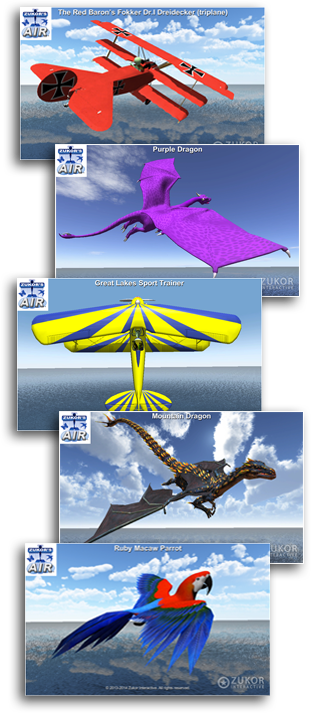
Broad Appeal
Zukor’s Air is
designed to strongly appeal to a very broad range of people, including all ages
of men, women, boys, girls and children. Zukor’s Air has 40 flying objects in
three categories: Aircraft (25), Animals (5) and Fantasy (10). Whether you are
training a 13-year-old boy, a 29-year-old woman, a 50-year-old man or a
9-year-old girl, Zukor’s Air has something for everyone.
A broad range of
aircraft, Animals, Fantasy Creatures,
and even three unique 1st Person Options where “you” are flying.
AIRCRAFT
A-10 Thunderbolt II “Warthog" ● Beechcraft
Bonanza ● Boeing 747-400 ● Boeing AH-64 Apache
● Eurofighter Typhoon ● Fokker Dr.I “Red Baron" ● General Dynamics F-16
Fighting Falcon ● Great Lakes Bi-Plane ● Grumman X-29 ● Hughes H-4 Hercules
“Spruce Goose" ● Lockheed F-117
Nighthawk ● Lockheed Martin F-22 Raptor ● Lockheed SR-71 Blackbird ● McDonnell
Douglas F-15 Eagle ● McDonnell Douglas MD-11 “Hot Pink" ● MD Helicopters
MH-6 Little Bird ● North American P-51 Mustang ● Northrop Grumman B-2 Spirit ● Supermarine
Spitfire ● Mitsubishi A6M Zero ● Wooden Toy Airplane ● Wright Bros. Flyer 1 ● WTF
(Wingless Titanium Flyer) ● Zselyi 2
ANIMALS
Bald
Eagle ● Bat ● Flying Squirrel ● Monarch Butterfly ● Ruby Macaw Parrot
FANTASY
Dragon
Bat ● Griffin ● KornEv ● Mountain Dragon ● Pink Dragon ● Pteranodon ●Wild Eyed
Watcher ● Winged Pink Pig “Penelope Pigs-Fly" ● Wyvern Dragon ● Zoot Jet
Pack ● Zoot Jet-Powered Chrome Surfer
FIRST PERSON
Airplane
cockpit ● Alien arms out (Superman style) ● Solo (nothing)

Highly Customizable & Options Galore
Zukor’s Air offers an
unprecedented amount of features, options and customizability to fit the needs
of the individual clinician’s feedback training style, as well as the unique
needs of each patient. Clinicians frustrated by current feedback games’ lack of
options will be amazed to see that Zukor’s Air has 9 separate areas of options,
each of which have up to 55 individual choices.
Clinicians use varied
neurofeedback and biofeedback protocols, so feedback games should be flexible
as well. Zukor’s Air does just that and allows the clinician to adjust the game
to fit their individual needs. This extensive level of choice and control
provide myriad benefits for both clinicians and patients, including those
discussed below.
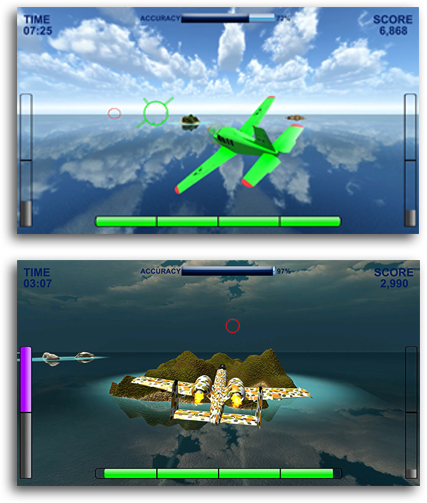
Interesting, but not over stimulating
Clinicians in the
field of neurofeedback have varying opinions and preferences about the level of
visual and auditory complexity and stimulation needed for patient feedback
options. Some clinicians and patients prefer a simple environment, keeping the
stimulation level at a minimum. Others prefer some complexity to the feedback,
as found in games, but do not want anything too stimulating.
Zukor's Air in unique
in that the clinician can tailor the complexity and involvement of the game to
meet the clinical needs of each patient. Zukor’s Air effectively allows the
clinician to “dial up or dial down” the stimulation level to suit their
neurofeedback training beliefs and/or the needs of individual patients.
The clinician can
achieve this through the abundant options built into the game, such as
increasingly sophisticated levels, standard and fantasy characters, night or
day mode, plus dozens of additional game variables the clinician can easily
control.
Clinician experience enhanced
One of the main
complaints we have heard from clinicians is that the currently available
feedback games quickly become an irritant to the clinicians themselves. The
reasons are numerous, but ultimately are caused by the inability to change
things within the game. This and hearing patients complain about the lame games
can significantly impact clinician fatigue during back-to-back neurofeedback
sessions.
Zukor’s Air and our
other feedback games solve this problem by giving the clinician control over
all variables, clinical and visual, within the feedback game. Clinicians will
find flexibility, variety and even enjoyment while working with patients all
day using Zukor’s Air. Flying through a beautiful and ever changing environment
is both interesting and relaxing, not just for the patients, but for the
clinicians themselves.
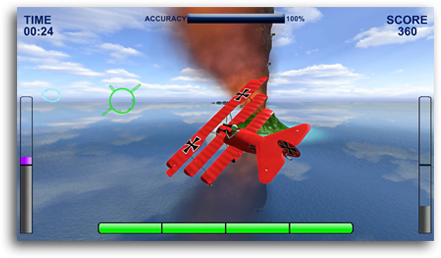
Intuitive and highly responsive gameplay logic
Zukor’s Air offers
extremely intuitive gameplay logic which is critical to a patient’s ability to
focus during their neurofeedback training sessions. An effective feedback
gameplay dynamic should not have to be explained to the patient, because this
requires them to think rather than relax and focus. Rather, the gameplay should
be obvious and mirror the real world, as well as be logically consistent within
the game. In all these areas, Zukor’s Air excels.
Reinforcing intuitive
gameplay is the need for the feedback game to be instantaneously responsive to
changes in input variables (EEG or biometric). Zukor’s Air is able to accept
and process input at the same rate as the neurofeedback or biofeedback system
software, so changes in the gameplay are directly reflective of the state of
the patient at any given moment.
Zukor’s Air offers
traditional and innovative new styles of threshold meters from which the
clinician can choose. However, if a feedback game contains meaningful,
interesting and intuitive gameplay, then traditional threshold meters, as part
of patient feedback, become unnecessary or even counter-productive. In general,
threshold meters are non-intuitive as they have to be explained to the patient,
often repeatedly. Indeed, in our clinical testing, we found this to be the case
and for most patients the threshold meters were turned off so the patient could
instead rely on the gameplay itself for feedback.
With Zukor’s Air the
gameplay is interesting, intuitive, instantaneous and meaningful. This allows
patients to remain focused on attaining the desired state rather than trying to
figure out the gameplay or understand multiple cryptic meters moving up and
down.
Patient Engagement
Many clinicians report
that some of the biggest challenges they face in working with patients,
especially with kids, are:
1. Getting the patient
to focus during a feedback session.
2. Getting the patient
to come back for their next appointment.
Zukor’s Grind helps
resolve both issues in several ways.
Increase patient focus during feedback session
Effective
neurofeedback requires the patient to maintain a relaxed-focused state for
extended periods of time during each neurofeedback session. Many clinicians
report patients falling asleep during neurofeedback sessions. A sleeping patient
is not receiving effective neurofeedback. Likewise, even among patients who are
awake, many lose focus, or become agitated, which also reduces the
effectiveness of the neurofeedback session. The problem is universal, but it is
particularly acute in children, adolescents and teenagers, especially boys.
Zukor’s Air’s multiple
truly unique game levels and many customizable game settings, including
aircraft and fantasy characters, time of day lighting choices, and many more
easy-to-change options, add variety to the feedback experience which thus
reduces patient boredom and increases patient focus during the neurofeedback
training.
Increased patient retention
One of the chief
problems many clinicians face is keeping patients returning for their next
neurofeedback session, i.e. patient retention. As one clinician bluntly put it,
“What good is neurofeedback if the patient doesn’t return for their next
appointment?” Zukor’s Air helps the clinician get the patient return for their
next neurofeedback session in several ways.
In addition to
multiple unique levels and many customizable game settings, Zukor’s Air’s
multi-faceted, built-in incentive system helps keep patients focused during
their neurofeedback session and also highly motivated to return. Zukor’s Air’s
incentive system includes patient selectable “nicknames,” period and session
scores calculated in multiple ways displayed on a separate Scores screen, a
“Top Scores” feature from which patients can compare their scores to other
patients (via their nickname only) and a printable Scores screen which patients
can take home.
Through these features
and options, Zukor’s Air will help get patients, especially the kids, to come
back for their next session. This also essentially extends the practical
usefulness of the feedback game for each patient. “I used to have to literally
bribe the kids with toys and even money to get them to return for each
session,” notes that same clinician. “Now, they want to come back to play
Zukor’s Air again.”
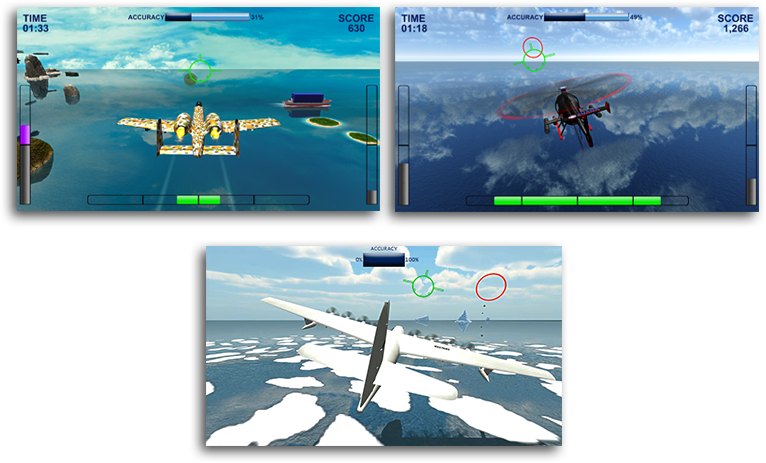
Feedback game protocols possible for research or clinical use
Zukor’s Air allows the
possibility for clinicians and researchers to develop feedback game protocols
when training various clinical presentations of neurological dysregulation
(i.e. under-activation, over-activation, or instability).
Since Zukor’s Air
provides clinicians virtually complete control of the game feedback features,
clinicians can now "tailor" the feedback the same way they
"tailor" the frequencies, time and placement sites trained during a
neurofeedback session.
These
"tailored" changes to Zukor’s Air feedback settings may be discovered
over time by clinicians to be effective when training a particular type of
dysregulation or client issue, thereby resulting in a type of "feedback
game protocol" to follow when setting up Zukor’s Air. Examples of these
types of protocols or "tailored" changes, include using the daytime
mode or multiple levels with under-activation issues and using night time mode
or a single level with over-activation or instability issues. Another example
is turning all objects off with over-activation or instability issues and conversely
leaving all objects on with under-activation issues.
Using the vast array
of options available in Zukor’s Air thus offers clinicians the flexibility to
change the game feedback enough to develop an actual "feedback
protocol" for each type of dysregulation.
Patient Profiles Clinicians can create feedback game profiles for each patient which will store all feedback game options, settings and scores for that patient in a HIPPA-compliant format. This means the clinician does not have to reset the options each time for each patient. The game will remember what was used last time. What’s more, the Patient Profile includes a “Nickname” feature so each patient can select a fun nickname for themselves which is displayed on the Scores screen.
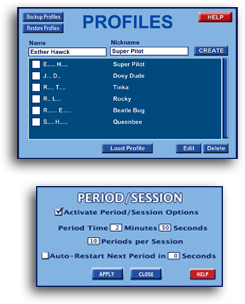
Period/Session Options Clinicians can easily setup the number of periods per session, the length of each period and the optional Auto-Restart Next Period at a desired time interval.
Meter Options The clinician can separately turn on or off the vertical or horizontal meters. Plus, there are five different styles of meters available, from the approach used in most current games to new meter styles which use more intuitive visual concepts and innovative graphical depictions.

Game Display Options The clinician can separately turn off different types of in-game, on-screen displays, such as speed meter, time, scores, etc.
Game Sound Options The clinician can separately turn off different types of in-game environmental sounds, such as skateboarding sounds, character sounds, etc. while not effecting the Reward Waves Sound.
Graphics Clinicians can adjust the graphics quality lower or higher to meet the capabilities of their specific computer system.
Environment Scenarios Clinicians can choose from three scenarios: Water Only, Icebergs and Islands. The icebergs and islands scenarios are populated with a diverse set of islands which appear randomly in both sequence and placement. The clinician can increase or decrease the number of icebergs or islands, or they can set them to automatically increase or decrease in number for each training period.
Game Object Options In addition to icebergs or islands, there are also three other types of objects which can add variety to the environment: Boats, Floating Aircraft (Hot Air Balloons and Zeppelins) and Gliders. Like the icebergs and islands, these objects can be set at a static number or increase or decrease each training period.
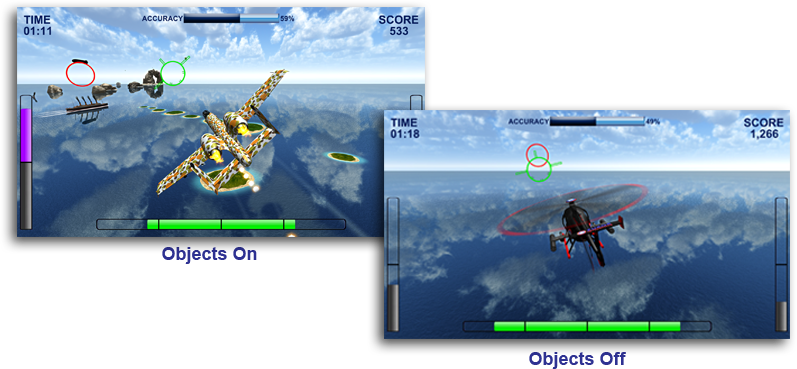
Time of Day Options The clinician can have the game environment appear as day or night (with moonlight). Another “Time of Day” alternative is the “Moving Sun” mode where the “sun” moves 360 degrees around the game environment. The “Time of Day” options in Zukor’s Air do more than add variety. They offer the clinician a powerful tool to control the “mood” of the game and thus support the desired patient treatment protocol.

Modality Presets Zukor’s Air includes modality presets for the most common modalities which are selected from a simple drop down menu. Zukor’s Air can be driven by all neurofeedback and biofeedback modalities, including 3 band “SMR” neurofeedback, Z-Score, HRV, BVP, EKG, GSR, Respiration and Temperature. The flight accuracy and scores can be driven by 1 to 12 events.
Modality Editor The Modality Editor in Zukor’s Air allows the clinician to create and/or edit additional modalities to be used with Zukor’s Air, which can be saved and accessed later.
The Modality Editor is not a substitute for the modality settings in the clinician’s feedback system software, but rather a way for the clinician to tell the game how to react to the clinical settings.
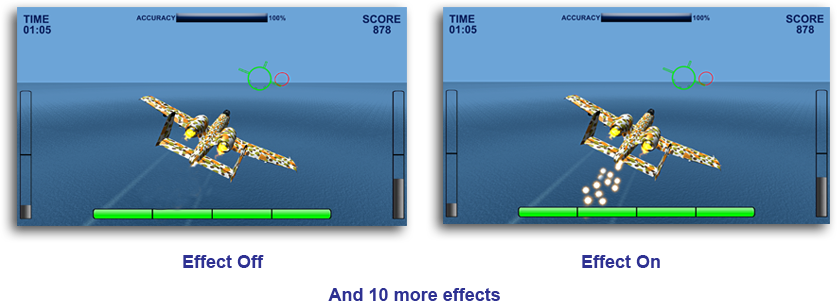
Secondary Gameplay Actions In addition to the events driving the primary gameplay action (flight accuracy and scores), the clinician can also define events to drive secondary gameplay actions such as bubbles, smoke or sparkles behind the aircraft, animal or fantasy creatures and other fun, interesting secondary actions.
Auditory Feedback Options Clinicians can select from a broad array of high-quality sounds from both music instruments and synthetic sources, including MIDI.
The feedback sound’s delay intervals can be set in milliseconds. The auditory feedback sound’s volume can be adjusted separately from the game’s environmental sounds.
There is also an option for “feedback based volume” so the volume of the sound depends on how well criteria is being met.
Flight Performance The flight performance can be altered in three fundamental ways: Flight Speed, Flight Volatility and Turn Angle. The flight speed in the game remains constant, but can be adjusted to be slower or faster. The flight volatility controls how much event data changes effect the flight smoothness. The turn angle which occurs at set intervals can be changed from 10 degrees to 90 degrees. Collectively this allows adjustment of the flight from peaceful to dramatic which the clinician can use to reinforce protocol goals.
Patient Retention Features
Flying Objects Zukor’s Air has 40 flying objects in three categories: Aircraft (25), Animals (5) and Fantasy creatures (10). The broad range of aircraft include historic (Wright Flyer, Spruce Goose), WWII era (P-51 Mustang, Spitfire, Zero), a colorful toy airplane, the Red Barron’s triplane, 747, a hot pink commercial jet, modern military (A10 Warthog, F-22 Raptor, B-2 Stealth Bomber) and two helicopters
The animals include a Bald Eagle and a butterfly. The fantasy creatures including four dragons, a griffin, a dinosaur and a alien with chrome jet-pack.

1st Person Perspective & No Flying Object Options Zukor’s Air can also be played from the 1st person perspective, either inside an airplane or as a flying alien showing only arms out-stretched “Superman-style.” Alternatively, the feedback game can be played with no flying object at all.

Computer systems which don’t meet these requirements may be able to run the game, but might encounter issues ranging from minor to extreme. Please note that these computer systems requirements are in alignment with those of the neurofeedback/biofeedback system companies.
MINIMUM COMPUTER SYSTEM REQUIREMENTS
Note: Most computers sold within the last two years will meet the first two requirements.
1. OPERATING SYSTEM
Windows 7 or Windows 8 on a regular PC or on a Mac (Bootcamp).
NOTE: Microsoft no longer supports many versions of Windows XP and Windows Vista.
IMPORTANT: Please make sure you have installed ALL Windows 7 or Windows 8 updates PRIOR TO INSTALLING and running Zukor's Air. Failure to do this may lead to improper operation of the game.
2. COMPUTER GRAPHICS REQUIREMENTS
Dedicated graphics card with at least 512 MB dedicated video memory.
NOTE: Systems which do not meet these graphic requirements will still likely play the game, but may require graphic adjustments within the game to reduce graphics quality so the game will play smoothly.
3. MONITORS/DISPLAYS
Two monitors (dedicated dual monitor setup).
Game monitor should be 21+ inches, “widescreen” and set at a minimum resolution of 1280x720.
NOTE 1: If using a laptop computer, the laptop screen counts as one monitor.
NOTE 2: A second monitor which meets the above requirements is a very inexpensive investment costing about $125-$175 on Amazon or at Best Buy.
NOTE 3: Video projectors, Plasma TVs and LCD TVs usually work as well, but could require the Windows graphic settings to be adjusted.
SUGGESTION: For an absolutely amazing feedback experience for your patients, invest in a 42-inch Plasma or LCD TV for your second monitor. These currently cost about $400 or less on Amazon or at Best Buy.